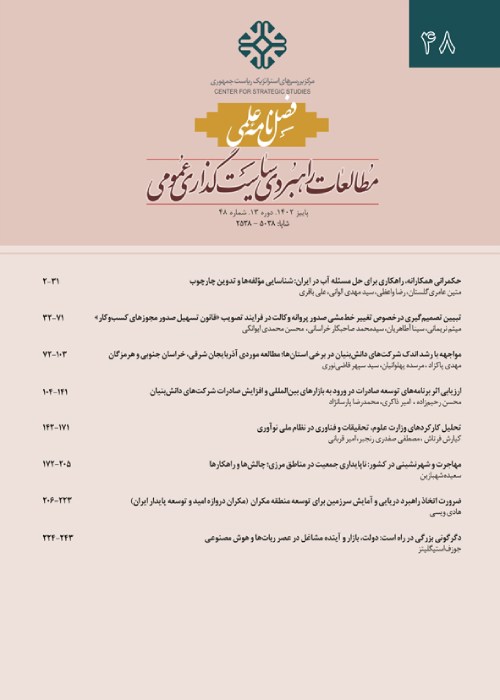The model of collaborative governance for developing renewable energies in Iran: Institutional perspective
Author(s):
Article Type:
Research/Original Article (دارای رتبه معتبر)
Abstract:
Whileover the past decade, national energy policies in Iran, have focused on market liberalization, collaborative governance has been selected as a new model for renewable energy development policies and has created new interactions between government and non-state actors. The collaborative governance of renewable energy development, as a major solution to pollution, climate change and economic growth, has been selected as a new model for development policies in Iran, and have caused new interactions between public, private, and public actors. This research by using qualitative methodology and after 25 semi-structured interviews with policy makers, managers of organizations and companies, NGOs and investors to present a participatory development model with an institutional approach in Iran. The collaborative governance is a process that has initiated by motivation and moving the engagement cycle through effective interaction. By resolving conflicts, building trust and creating commitment amongst actors, this cycle enhances the collaborative process and achieves the desired outcomes. In this model, the dual role of cognitive, normative and formal institutions as a factor for progress and simultaneously a factor for prohibition of collaboration have investigated. The government by introducing incentive laws, has created the incentive to invest in this sector. But some of the normative and cognitive institutional barriers, such as conflict of interests, non-commitment of state officials and private-sector distrust, have led to a lack of progress in development. At the end, some solutions including: commitment tools (campaigns, coalitions, and associations), participation of state organizations in paying social and social benefits, realizing the prices of energy carriers and using the combination of demand-side policies as the supply side have been proposed.
Keywords:
Language:
Persian
Published:
Journal Strategic Studies of Public Policy, Volume:9 Issue: 30, 2019
Pages:
133 to 155
magiran.com/p2003581
دانلود و مطالعه متن این مقاله با یکی از روشهای زیر امکان پذیر است:
اشتراک شخصی
با عضویت و پرداخت آنلاین حق اشتراک یکساله به مبلغ 1,390,000ريال میتوانید 70 عنوان مطلب دانلود کنید!
اشتراک سازمانی
به کتابخانه دانشگاه یا محل کار خود پیشنهاد کنید تا اشتراک سازمانی این پایگاه را برای دسترسی نامحدود همه کاربران به متن مطالب تهیه نمایند!
توجه!
- حق عضویت دریافتی صرف حمایت از نشریات عضو و نگهداری، تکمیل و توسعه مگیران میشود.
- پرداخت حق اشتراک و دانلود مقالات اجازه بازنشر آن در سایر رسانههای چاپی و دیجیتال را به کاربر نمیدهد.
دسترسی سراسری کاربران دانشگاه پیام نور!
اعضای هیئت علمی و دانشجویان دانشگاه پیام نور در سراسر کشور، در صورت ثبت نام با ایمیل دانشگاهی، تا پایان فروردین ماه 1403 به مقالات سایت دسترسی خواهند داشت!
In order to view content subscription is required
Personal subscription
Subscribe magiran.com for 70 € euros via PayPal and download 70 articles during a year.
Organization subscription
Please contact us to subscribe your university or library for unlimited access!


